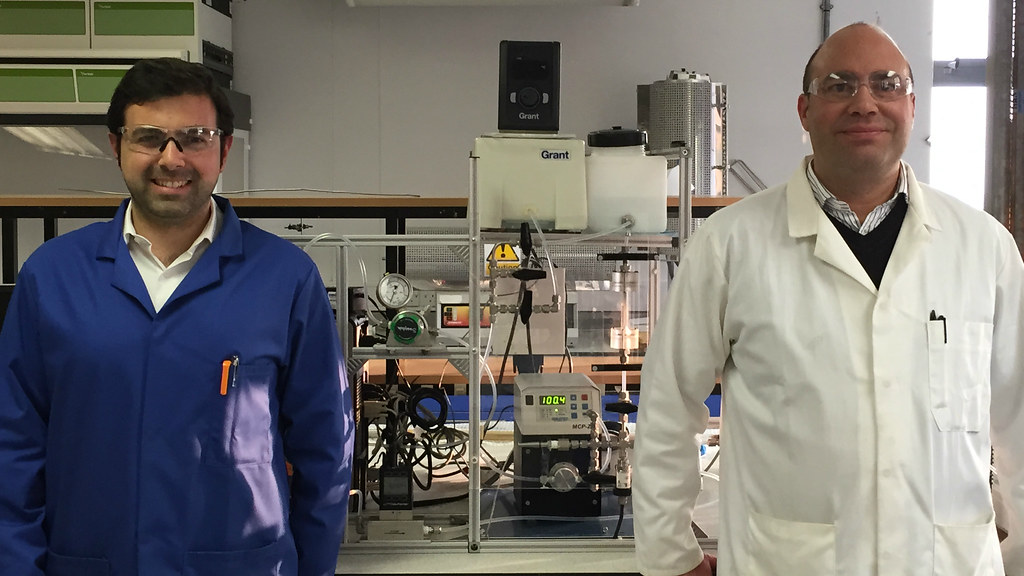The 'immortal membranes’ should be able to separate water from problematic particles such as pharmaceuticals or pollutants.
Dr Darrell Patterson and Dr Davide Mattia, in our Department of Chemical Engineering, are part of a collaboration between six UK universities that has been awarded a £6m EPSRC grant over five years.
This funding will enable a collaborative project entitled ‘From membrane material synthesis to fabrication and function’ (SynFabFun), led by Newcastle University, to establish a UK virtual membrane centre that will act to unite the UK membrane research community.
Improving membrane performance
The programme will look at improving membrane performance in four main industry sectors important to the UK and worldwide: Energy, Manufacturing, Pharma and Water. In all these industries, membranes have the potential to, and in some cases already do, provide a lower energy alternative to existing separation technology, requiring significantly smaller capital costs.
Membranes are not yet widely used for some applications due to their operating costs, requiring periodic cleaning and, eventually, replacement. This is caused by the loss of permeability and/or selectivity during service, and is due to both the membrane material changing and degrading (known as ‘ageing’) as well as a build-up of unwanted material on the surface of the membrane (known as ‘fouling’).
Each of the collaborating universities will be conducting research into a specific aspect of membrane development. Dr Patterson will be investigating how to produce membranes on a large scale, using the latest technology present in 3D printers, whilst Dr Mattia will focus on creating novel hybrid membranes that will combine the best features of organic membranes with those of ceramic membranes, effectively creating a completely new family of membranes.
Industry engagement
This programme is supported by a number of significant industry partners including Johnson Matthey, Evonik, GSK, BP, Pervatech, Bluestone Global Tech, Anglian Water, Severn Trent Water, Thames Water and Scottish Water whose engagement in the projects will enable the research to have a direct impact across the UK industry.
Commenting on the University receiving this research grant, Dr Patterson, Head of the University’s Membrane Science and Engineering Research Cluster, Membranes@Bath, said: “This work further adds breadth and depth to the extensive membrane separation research at the University of Bath. What is most significant and exciting for me is that a wide range of industries are set to benefit from this research, which is demonstrated by the number of industrial partners we have.
“The novel ‘immortal’ membranes that we make will help solve some of the grand challenges of applying membrane technology in these industries and through this, hopefully provide wider societal benefits.”
Dr Mattia, Associate Professor in Chemical Engineering, added: “In this project, we will employ novel nanomaterials such as nanotubes, graphene and others to design membranes that do not suffer from ageing or fouling. Using this technology will use less energy than traditional separation methods, reducing carbon emissions, improving water quality as well as the competitiveness of the UK industry.”
World class
EPSRC Chief Executive Professor Philip Nelson said: “Put simply, world-class projects like this help to make the UK the best place in the world to research, discover and innovate. This investment will fuel the UK’s technological progress, help address the challenges of today and tomorrow, and contribute to a strong economy.”
Dr Tim Mays, Head of the Department of Chemical Engineering, added: “This is a fantastic project for the University of Bath to be involved in. There is a wealth of water research expertise at Bath, across all disciplines. This new grant will see Drs Patterson and Mattia collaborating with water utility providers and other application areas from across the country, and will cement their already established expertise in membrane research.”
Research carried out by our Department of Chemical Engineering was recently ranked sixth nationally for impact by the 2014 Research Excellence Framework, an independent assessment of UK university research activity.

